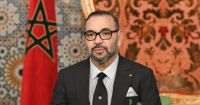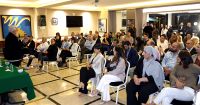Moving to Russia? Get ready to answer some questions about Soviet dictator Josef Stalin first. And beef up on your knowledge of Crimea while you are at it.
A proposed Russian immigration test requires foreigners seeking work permits or residency in Russia to answer questions about Russia's annexation of Crimea last year and Stalin's rule, a draft of the exam published by Russian media Monday indicates. The test could be rolled out in July to replace a less complicated exam that includes questions on Russian language, law and history.
New immigration restrictions increase the minimum vocabulary requirement to 1,250 words from the current 950. Questions on Russia's history include: “In which century did Crimea join Russia under Catherine the Great?” The answer, of course, is the 18th century, nine years after the peninsula gained a degree of independence amid the Russo-Turkish wars.
The exam also asks about Irina Rodnina, a three-time Olympic figure-skating champion, and the name of the leader of the Soviet Union during World War II. Stalin is the correct response.
Applicants for work permits must answer 60 percent of questions correctly. Applicants for resident status must get 75 percent of the test correct, the Moscow Times reported. Roughly 440,000 foreigners have taken the test since it became mandatory this year.
Russia celebrated its "reunification" with Crimea in March. The European Union, Ukraine and the United States opposed the annexation.
"On this one year anniversary of the sham 'referendum' in Crimea, held in clear violation of Ukrainian law and the Ukrainian constitution, the United States reiterates its condemnation of a vote that was not voluntary, transparent or democratic. We do not, nor will we, recognize Russia’s attempted annexation and call on President Putin to end his country’s occupation of Crimea," the U.S. State Department said in a statement last month.
"Over the last year, the human rights situation in Crimea has deteriorated dramatically, with mounting repression of minority communities and faiths, in particular Crimean Tatars, and systematic denial of fundamental freedoms. Local residents have been detained, interrogated and disappeared, and NGOs and independent media have been driven out of the peninsula. These brutalities are unacceptable and we call on Russia to stop further abuses."
Source: International Business Times





